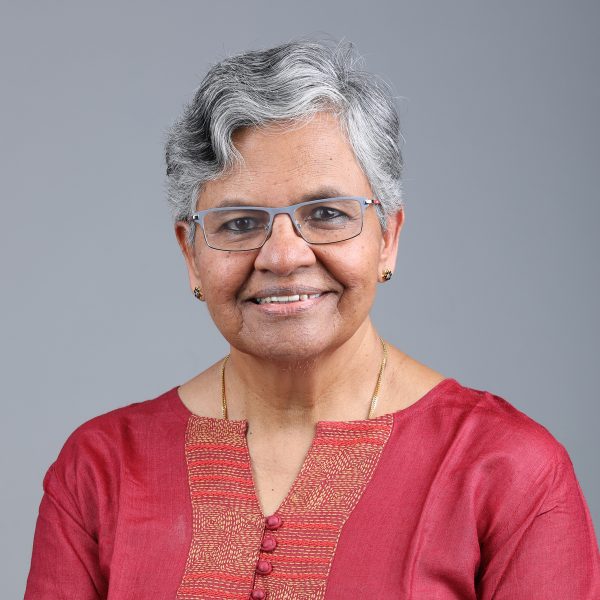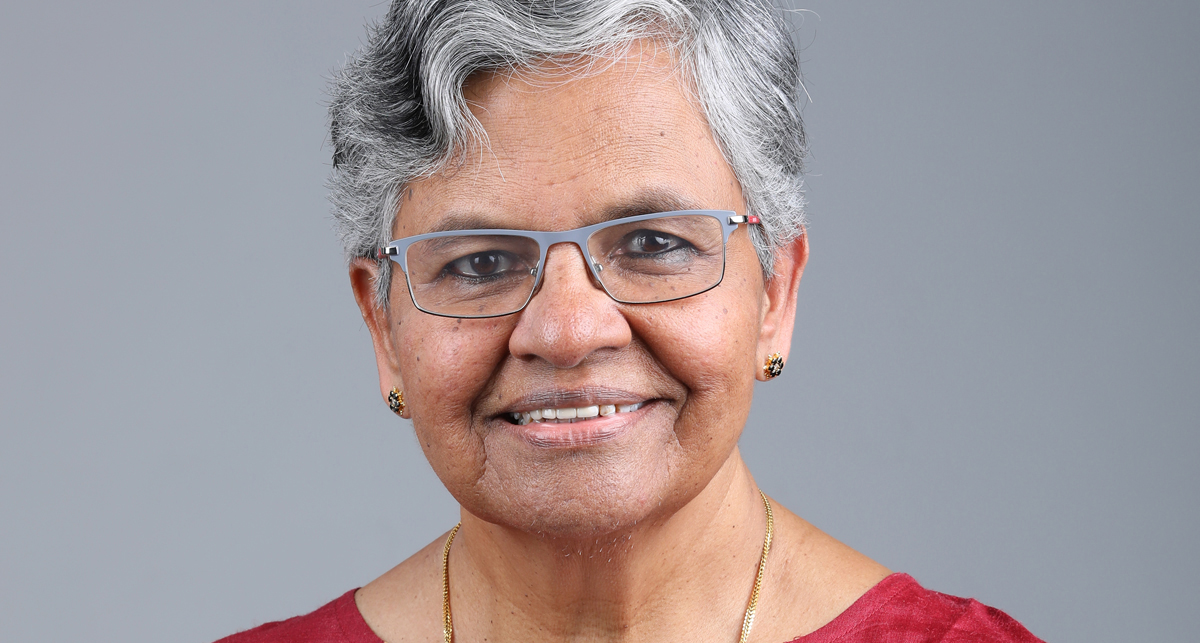Zur deutschen Übersetzung / Also available in German
Dr. Aruna Gnanadason directed the global programme on Women in Church and Society of the World Council of Churches, Geneva and coordinated its programme on Justice, Peace and Creation (1991 till 2009). She holds a doctorate in ministries (DMin) in feminist theologies and a Master’s in English literature and has three honorary doctorates.
She now lives in Chennai, India and resources the churches and the ecumenical movement in India and globally reflecting on the role, the challenge and the alternatives offered by the gospel in addressing the impact of patriarchy, caste and global capitalism on the people and the earth. Since returning to Chennai she has been active in the Indian Christian Women’s Movement – an informal movement of Protestant, Roman Catholic and Orthodox women of which she presently is National Convener.

Aruna, your last book “With courage and compassion” on the contribution of women to societies, churches and the ecumenical movement was published recently. What are your findings? Is there hope for the church regarding gender equality?
With Courage and Compassion celebrates the lives and contributions of women to their local contexts and struggles and names some of their challenges. It focuses on the international level on the ecumenical movement and particularly on the initiatives with and by women through the World Council of Churches. It takes a critical look at major milestones in women’s ecumenical history and marks the solidarity offered by the World Council of Churches to women in resourcing the work and in recognizing women’s rights as well as their theological and pastoral contributions as an integral part of the ecumenical agenda. The book “peeps behind and through” ecumenical history to identify many of the signs of hope that women have experienced but also their disappointments.
The focus is on the period when I was holding a position of leadership in the WCC and explores some of the issues that have threatened to divide women themselves by race, age and theological differences, merging with denominational loyalties. One of the most fulfilling experiences in this journey has been the partnership with Orthodox Christian women – ensuring their full participation in the life of the ecumenical movement and in encouraging women from other church traditions to respect the gifts Orthodox women bring to our common discourse. Added to this was the important work the WCC did in influencing the work on women and economic justice.
The struggles of women for justice and dignity
are far from over.
The two major issues addressed in the book are – the issue of violence against women and the question of the ordination of women to priesthood. It is acknowledged that these are by no means the only issues that preoccupy women, but remain issues that call for urgent attention as they could hamper the full and creative participation of women in the church and do sometimes cause divisions and even controversies among us as women, as the book demonstrates. Ordination of women is not just a right and calling of women – it also provides the opportunity for women to provide constructive criticism of ordained ministry as it exists so that with men women can forge a new definition and role for ordained ministry in our world today. Touching on ecclesiological questions as a means for renewal and transformation and even unity of the churches, has been far from easy as it challenges how ecclesial and spiritual power is handled in our churches.
Defending Human Rights and in particular Women’s Rights are on top of your lifelong agenda. Working for the worldwide churches means also speaking out and acting against violence against women, everywhere. What do you expect today of the churches‘ leadership but also of ordinary church members in this regard?
The book affirms that in women there is an amazing reservoir of power. Women’s determination and resilience is what has been their greatest contribution to the church and to society. This is evidenced by their role in justice movements and in working for peace at all costs in situations of conflict. Their powerful and courageous participation in the life of the churches and the ecumenical movement, in spite of patriarchal strictures and hurdles, is to be affirmed.
The struggles of women for justice and dignity are far from over. In spite of the great power and resilience of women and all the strategies they have thus far utilized, they have not been able to completely transform systems and processes that permit the untold forms of cruelty against women – the violence women experience continues with great brutality. Women have repeatedly spoken of the fact that there are no safe spaces for them – in the world, in the church and even in the context of their families.
It explores the roots of violence – the militarization of the world and the culture of violence it seems to permit; social practices and taboos that are embedded in our cultures which legitimize violence; and economic injustices and the feminization of poverty which makes women vulnerable and open to abuse. Religious teachings, including those of Christianity seem to give divine sanction to treating women indifferently and limiting their participation.
“There is a daily rise in domestic violence cases
due to the ongoing national lockdown”
While impunity in the abuse of political or military power has been recognized as abhorrence – the same cannot be claimed hen it is women who are the victims particularly in the “domestic sphere”. It is often women who the target of punishment if they have the courage to resist and challenge power.
Perhaps the most challenging part of the years when I was responsible for the work have been the sometimes heart-breaking, solidarity visits to women in situations of conflict (such as the former Yugoslavia, the Sudan, Sierra Leone and Liberia, East Timor and Pakistan to name some). While on the one hand these visits underlined the power of the women, who do pioneering and brave work to confront violence and even attempt to stop the fighting; the visits also challenge the ecumenical movement to address more fully the question as to why sexual violence is becoming even more aggressive and brazen from one conflict situation to the next.
Domestic violence is a worldwide issue. This time of the Corona-Virus-Crisis and the lockdown shows clearly that more vulnerable people are trapped without refuge. How do you see the situation in your country?
The National Commission on Women (NCW) in India has spoken out strongly against the daily rise in domestic violence cases due to the ongoing national lockdown imposed on 25 March 2020 and now extended to May 3. According to the data of NCW a total of 370 complaints related to women issues were received in the first two weeks of the lock-down. Out of the 370 complaints, the highest 123 were of domestic violence, the data said. But then it is common knowledge that this is only the tip of the iceberg as the data relates only to urban based women who have access to ways to communicate (email and telephones). This data is of course important as it reveals that many women who are victims of domestic violence are more vulnerable during the lockdown period – with men using the bodies of women and children to vent their frustrations on. Fewer women complain in such a context.
The situation of poor women is much worse and the levels of domestic violence in this sector are not quantified as yet – though government officials have identified increase in violence against women. Unfortunately, the government was ill-prepared to handle the economic fall-out of the lock down, leaving large sections of the working class (particularly day wagers) without income or homes. Statistics of domestic violence are hard to assess in this context. With all forms of transportation closed, in the first week alone, an estimated 40,000 migrant workers walked hundreds of kilometres to reach their villages of origin from the cities where they had been working. In a patriarchal society in India, the survival of families in such contexts falls squarely on the shoulders of women who are expected to find food, water and shelter for their families.
“Social distancing” is the order of the day. Yet we need even a deeper consciousness for sharing and caring. How can religious communities express the common responsibilities in times of fear and distress?
In India the concept of social distancing or more appropriately “physical distancing” is a luxury not available to millions of the poor! Families of 5 to 10 persons (usually extended families) live in one room or two room homes. Images of migrant labourers crowding into railway stations desperately trying to reach their homes fill our TV screens. The government and private sector, including churches are trying their best to provide food and more humane living conditions for the people but the potential for the virus to spread are acute!
“This is a good occasion for honest introspection and evaluation
of the values we have upheld as Christians”
The churches have all closed down gatherings for worship – even through the holy week! For those who can afford it and have access online worship services are regularly organized and many have drawn back to family prayers. It has provided a space for dialogue and discussion on concepts such as “clericalism” and the “priesthood of all believers” – with church leaders and theologians providing talking points for such discussions on social media.
The service ministries of the churches have become stronger – for example, 1,000 Christian hospitals have offered their facilities to the government to be transformed into care centres of Corona infected people. Many individuals and groups have begun using their resources and time to provide food for the hungry, Christians and others. I believe that this is a good occasion for honest introspection and evaluation of the values we have upheld as Christians and the Church so as to identify points at which we have become complacent. Opportunities to contribute of our best to the nation are challenging Christian/ecclesial life styles – it is hoped that will have a lasting impact on the churches and on Christian communities!
*Aruna Gnanadason, With Courage and Compassion, Women and the Ecumenical Movement, Fortress Press, Minneapolis, 2020
Questions by Sabine Dreßler, EKD

